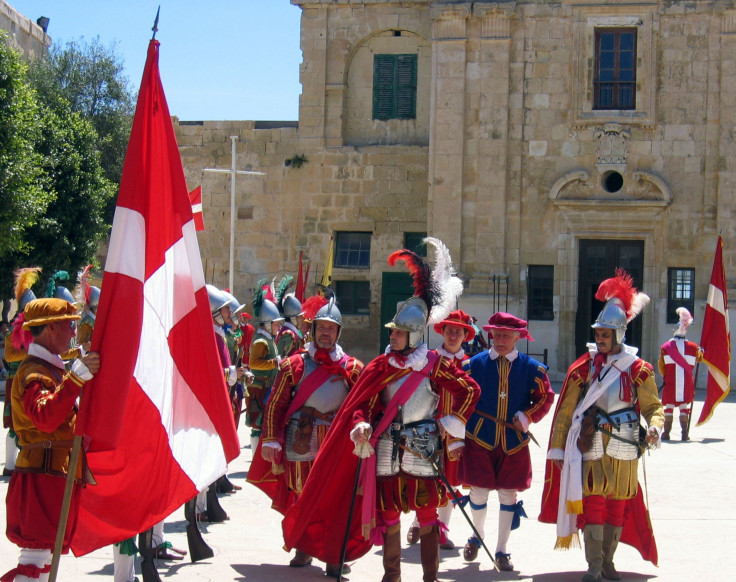Knights Of Malta, A Remnant Of The Middle Ages, To Open Shelters, Soup Kitchens, Across Europe

The chivalric Catholic order, The Knights of Malta, is celebrating the 900th anniversary of its recognition by the Vatican by opening soup kitchens and homeless shelters across Europe and Britain in response to the brutal economic crisis that has thrown millions of people out of their homes and jobs.
In February of the year 1113, Pope Paschal II issued a bull (or decree) granting recognition to The Sovereign Military Hospitaller Order of St John of Jerusalem of Rhodes and Malta (the formal name of the group) during a time when Europeans fought to restore Christianity in the Holy Land and Jerusalem, i.e., The Crusades.
The Order originated in the prior century, when a monk established an infirmary in Jerusalem to care for pilgrims in the Holy Land. During the Crusades, the order adopted more of a military countenance, while maintaining its humanitarian mandates.
The papal bull indicated that the Knights would be independent from bishops or any secular authorities – and, in a sense, provided the Order with its own "sovereignty."
In the modern world, the Rome-based Knights – some 98,000-member strong – assist in humanitarian efforts in crisis hotspots around the globe, including Syria, Democratic Republic of Congo, Haiti and Afghanistan.
On the whole, the religious order operates hospitals, ambulance services and senior citizens’ homes on six continents.
Now, given the immense financial hardships faced by the British and Europeans in the wake of drastic spending reductions and job cuts, the Knights have moved their charitable efforts more toward the continent.
"We are observing with great concern the fact that the economic crisis is leading to greater numbers of unemployed, more homeless and more people falling through the social net," Albrecht Boeselager, a senior member of the Knights, told The Daily Telegraph newspaper.
"The number of people who come to our soup kitchens and medical clinics is increasing dramatically. In the 27 nations of Europe, there are now 26 million people out of work. We're establishing a stronger presence in Britain than ever before. Until now our main activity in the UK was to run homes for the elderly."
In Britain, the Knights have already run such facilities in Oxford and Brighton, and will soon introduce new centers in London and Glasgow.
"We're adapting to current necessities, as we have done for a thousand years," said Philippa Leslie, a British spokeswoman for the Knights.
The Knights of Malta have a lengthy and fascinating history.
After failing to secure for Jerusalem for Christianity, the Order relocated to the Mediterranean island of Cyprus, then to Rhodes, and finally to Malta (hence, their current name).
Before Napoleon of France evicted the Order from Malta (which they ruled for centuries), they moved to Rome.
Knights themselves are not priests, and they traditionally have come from European nobility.
One of the most unique "stateless sovereign states" in the world, the Knights keep diplomatic relations with more than 100 nations; have their own constitution, courts, legal codes; and issue their own coins, stamps, license plates and even passports. The Order also has observer status at the U.N.
The Telegraph noted that Matthew Festing, a former auctioneer at Sotheby's, now heads the Order. He holds the grandiloquent title of His Most Eminent Highness, The Prince and Grand Master of the Knights of Malta.
"It is, I suppose, a series of contradictions," Festing, an Englishman, told the Associated Press.
"I'm on the inside of [the Order], so it doesn't seem to be contradictory to me, but maybe it is. On the one hand it's a sovereign entity. On the other hand it's a religious order. On the other hand it's a humanitarian organization. It's a complicated mixture of things.”
Pope Benedict XVI, who will honor the Knights in a procession on Saturday, is himself a Professed Knight.
Festing commented on how some may view the Order as an archaic remnant of the Middle Ages.
"It's not exactly out of date, but you can't maintain that in the 21st century," he noted.
"In general terms, in the old countries of Europe, we maintain the nobiliary requirement to an extent. But only to an extent. But in places like Australia, Central America, North America, Southeast Asia, it's all done on a different basis."
The Order has an annual budget of some 200 million euros ($271 million), largely funded by European governments, the U.N. and EU.
Moreover, the Knights have sometimes been criticized for serving as a wealthy elitist gentleman’s club.
"We certainly don't want to be, and in fact we're not a sort of rich man's club," Festing told AP.
"To a sort of an extent you could say, 'Well maybe they are, slightly.' But that's not the basis of it, otherwise I wouldn't have gotten in."
Perhaps the most famous (and controversial) Knight of all was the acclaimed Italian painter Michelangelo Merisi da Caravaggio, who was inducted as a member by Alof de Wignacourt, Grand Master of the Knights, in the early 17th century. After producing a number of well-received works under the patronage of the Knights, the tempestuous and Caravaggio fell afoul of the Order and was arrested and imprisoned (allegedly for assaulting a fellow Knight during a drunken brawl). He was later expelled from the Order.
© Copyright IBTimes 2024. All rights reserved.





















